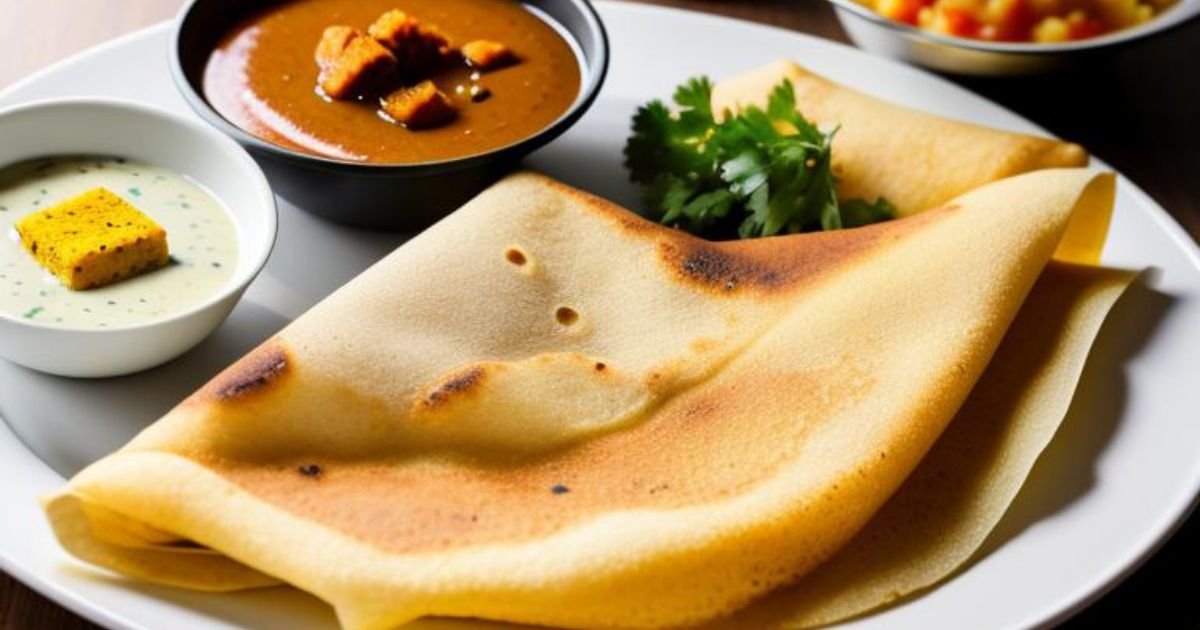Dosa Nutritional Value Per 100g holds the key to understanding the health benefits of this beloved South Indian delicacy. Dosa, a staple of South Indian cuisine, is a versatile and beloved dish worldwide. Its popularity is not only attributed to its delicious taste but also to its nutritional value.
Beyond its delectable flavor, delving into dosa’s nutritional profile sheds light on its wholesome attributes, guiding informed dietary choices. Let’s explore the dosa’s nutritional breakdown per 100g serving and uncover its hidden treasures for a nourishing dining experience.

Dosa Nutritional Value Per 100g: Macronutrient Composition
Carbohydrates: Dosa primarily comprises carbohydrates, predominantly in the form of rice and lentils, making it an excellent energy source.
Proteins: Lentils used in dosa batter contribute significantly to its protein content, offering essential amino acids crucial for muscle repair and growth.
Fats: While dosa is generally low in fat, the addition of oil or ghee during cooking can slightly increase its fat content, providing essential fatty acids vital for various bodily functions.
Dosa Nutritional Value Per 100g: Micronutrient Content
Vitamins: Dosa serves as a reservoir of vitamins, particularly vitamin B like thiamine, riboflavin, and niacin, essential for energy metabolism and neurological function. Additionally, dosa contains traces of vitamin C, imparting antioxidant properties to combat oxidative stress.
Minerals: Rich in minerals like iron, calcium, and phosphorus, dosa contributes to bone health, blood clotting, and muscle function. These minerals play pivotal roles in various physiological processes, underscoring the nutritional significance of dosa in a balanced diet.
Dosa Nutritional Value Per 100g
Nutrient | Amount per 100g |
Calories | 168 kcal |
Protein | 3.9 grams |
Carbohydrates | 30 grams |
Dietary Fiber | 1.1 grams |
Fat | 3.7 grams |
Vitamin B | Varies |
Iron | Varies |
Calcium | Varies |
Dosa Nutritional Value Per 100g: Health Benefits
Digestive Health: The fermentation process involved in dosa preparation enhances its
probiotic content, promoting gut health and aiding digestion.
Weight Management: With its balanced macronutrient profile and relatively low calorie
count, dosa can be a satisfying option for those watching their weight.
Blood Sugar Regulation: The combination of complex carbohydrates and proteins in
dosa helps in regulating blood sugar levels, making it suitable for individuals with
diabetes.
Dosa Nutritional Value Per 100g: Potential Concerns
Sodium Levels: Sodium content, primarily from salt used in batter preparation, may pose concerns for individuals with hypertension or cardiovascular issues. Monitoring sodium intake and opting for low-sodium alternatives can mitigate these risks while enjoying dosa as part of a balanced diet.
Glycemic Index Considerations: While dosa exhibits a moderate glycemic index, individuals with diabetes or insulin resistance should be careful about portion size and accompanying foods to prevent rapid spikes in blood sugar levels. Pairing dosa with fiber-rich foods can help modulate glycemic response and promote better blood sugar control.
Allergies and Intolerances: Individuals with allergies or intolerances to ingredients like gluten or lentils must be careful while consuming dosa or opt for alternative recipes that accommodate their dietary restrictions. Exploring gluten-free flours or legume substitutes can offer allergen-friendly dosa options without compromising taste or nutrition.
Conclusion
In conclusion, Dosa Nutritional Value Per 100g unveils a tapestry of healthful attributes, making it a versatile and nourishing addition to any diet. By embracing the nutritional bounty of dosa, one can indulge in this South Indian classic guilt-free while reaping its myriad health benefits. Whether enjoyed for breakfast, lunch, or dinner, dosa captivates palates and nurtures bodies, solidifying its status as a culinary gem for generations to come. However, mindful consumption is key, considering potential concerns such as sodium content and allergens. Incorporating dosa into a well-rounded diet can contribute to overall health and well-being.
You may also like Benefits of Gulab Jamun, What is Collagen Type X, Benefits of King Chilli
People also ask
- What is the nutritional value of dosa?
A standard dosa (approximately 100 grams) provides around 168 calories, 3.9 grams of protein, 30 grams of carbohydrates, 1.1 grams of dietary fiber, and 3.7 grams of fat, along with essential vitamins and minerals like vitamin B, iron, and calcium.
2. How much protein is in 2 dosa?
Two dosas contain approximately 7.8 grams of protein.
3. Is dosa rich in protein?
Dosa is not particularly rich in protein, but it does provide a moderate amount of protein relative to its carbohydrate content.

Pingback: What is Collagen Type X -
Pingback: Benefits of King Chilli -
It is a pleasure to read this weblog, thanks to its up-to-date information and interesting posts. Look into my web page QN7 for some really good points and find out more about Thai-Massage.
I am genuinely thankful to the owner of this website for sharing his brilliant ideas. I can see how much you’ve helped everybody who comes across your page. By the way, here is my webpage QU5 about Cosmetics.